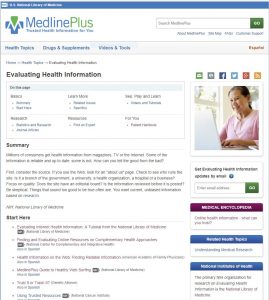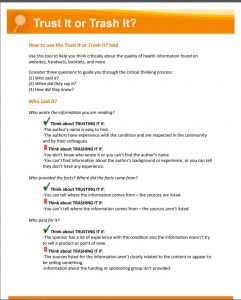Apr
17

Posted by Susan Halpin on April 17th, 2018
Posted in: Blog, NLM Resources
Tags: Evaluating online information, trust it or trash it
Any guesses on what the 2017 “Word of the Year” was?
It was actually a term, not a word. The term was “Fake news.”
Just 18 months ago this term was not familiar to most of us. However, “fake news” has become a very important topic to all of us. According to a recent article written by The Telegraph (April 7, 2018) “fake news” is considered “one of the greatest threats to democracy, free debate and Western order.”
This blog post is not about current events or politics, however, it is about the importance of knowing how to evaluate the credibility of online information. Our focus here at the NER is health and medical information. NLM offers some useful tools that you can use to evaluate online health information. Although health information is the theme of this article, the information presented can be applied as you evaluate other online information, regardless of the subject.
MedlinePlus offers a valuable tutorial about how to evaluate online health information. . You can click on the link https://medlineplus.gov/evaluatinghealthinformation.htmlor you can use the search box at the MedlinePlus home page https://medlineplus.gov , just type “Evaluating Online Health Information” in the search box.

MedlinePlus Guide to Healthy Web Surfing
MedlinePlus provides a detailed guide to evaluate the credibility of a web site https://medlineplus.gov/healthywebsurfing.html.
The key points from the guide are:
Know who is responsible for the content. This information is often on the “about us” page, or it may be under the organization’s mission statement, or part of the annual report.
Does the site have an editorial board? Is the information reviewed before it is posted?
Does the site make health claims that seem too good to be true? Does the information use deliberately obscure, “scientific” sounding language? Does it promise quick, dramatic, miraculous results? Is this the only site making these claims?
Does the site identify the author? Does it rely on testimonials?
Is the information current? Look for dates on documents.
Who pays for the site?
Does the site have a privacy policy and tells you what information they collect?
Trust It or Trash It Tool
I find that The Trust It or Trash tool (http://www.trustortrash.org/.) is very helpful because I can print out the .pdf file and have beside me as I read and evaluate the credibility of information.

In addition to providing several useful tools to help you become a critical consumer of online health information, here are some additional reasons why you should consider getting your health information from MedlinePlus: